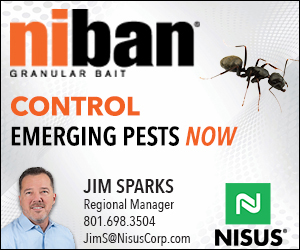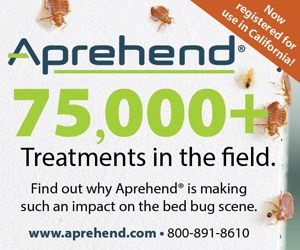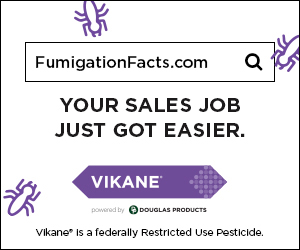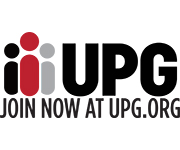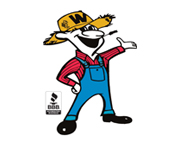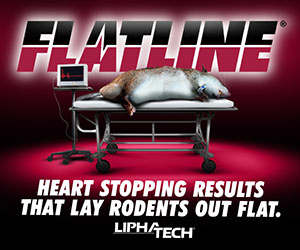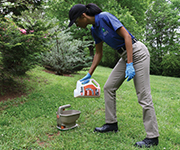 |
||||||||||||||||||||||||
|
August 2021
|
||||||||||||||||||||||||
|
Chief Executive Officer's Notes
As summer is winding down, it’s been a relatively a quiet year in the legislature. However, there are a couple things we are watching now that need our attention. First, potential new regulatory requirements coming from USEPA on Structural Fumingation and additionally aggressive action at the local level related to pesticide applications near coastal communities. At our Board meeting in September, our legislative committee plans on talking about both these issues with PCOC legislative advocate Dominic DiMare and NPMA Regulatory Director Jim Fredericks!! Hope to see you all there!
Chris Reardon Upcoming Events
September Board of Directors Meeting — IN PERSONOur first in person meeting since COVID! We will have our first in person meeting at The Carlsbad Westin. The schedule below is tentative and may change (the dates will stay the same): Thursday, September 23 Golf Tournament — 1:00 pm Tee Off Friday, September 24 Committee Meetings — 8:00 am to 12:00 pm Room reservations are limited and can be made HERE. We are so excited to meet up in person again and hope that you can all join us!
Looking Forward...December BOD MeetingDecember 9-10, 2021 PestEd Series Dates & Locations TBDTermite Academy Dates TBDApril BOD Meeting & Legislative DayMarch 7-9, 2022 2022 Expo 2022June 8-10, 2022 CAPMA Monthly Insurance/Safety Tip
Employers Face Wrongful Death Claims from Pandemic
Nationwide, at least 18 cases of wrongful death have been alleged by surviving family members of employees who died from COVID-19. The lawsuits contend that the employers provided unsafe working conditions and failed to follow federal and local COVID-19 safety guidance. What’s more, the lawsuits seek to go beyond the “exclusive remedy” of workers compensation and seek monetary damages by alleging negligence. “Exclusive remedy” is shorthand for the bargain between employees and employers that exists in the workers compensation system where employees give up their right to sue employers in exchange for no fault insurance against any injuries they incur (see our article, “5 Exceptions to the Exclusive Remedy Rule” in this issue). Employer defendants in more than half of the COVID-19 injury or wrongful death lawsuits being tracked by the National Council on Compensation Insurance (NCCI) argue that the workers compensation exclusive remedy provisions in state laws bar such litigation. As courts continue to open, litigation by a worker or worker’s surviving family member against an employer over a COVID-19 infection or death is likely to continue. “The covid litigation logjam broke in the spring,” Carin Burford, Ogletree, Deakins, Nash, Smoak & Stewart P.C., in Birmingham, Ala., told Business Insurance, adding that lawsuits are likely to pile up. “Court cases involving COVID-19 infections that bring in aspects of exclusive remedy … [are] not entirely unexpected,” Adam Levell, NCCI’s senior counsel, wrote in an email to Business Insurance, adding that it’s likely “more cases may emerge in the coming months/year as the pandemic evolves and states continue to loosen pandemic-related restrictions, businesses reopen, and people return to the office/traditional workplace.” Lanzo v. Generations Behavioral Health is typical of these pandemic wrongful death cases, as summarized by law firm Fisher Philips, The plaintiff, the wife of a deceased employee working as a nurse at a mental health facility, alleges wrongful death under Ohio law. In support of her claim, the plaintiff alleges that the mental health facility failed or refused to follow COVID-19 directives issued by the state in order to reduce the spread of the virus. This, the complaint states, exposed her husband, Raymond Lanzo, to COVID-19. The complaint does not claim the facility was wrong to operate during the pandemic, but that it failed to implement the policies and procedures that it should have in place to follow the state’s pandemic directives. The plaintiff further alleges that the company was “negligent” in its failure to provide “appropriate safety equipment.” Allegations in the complaint also include that the mental health facility’s conduct was “wanton and willful,” likely both to enhance damages and avoid any argument by Generations Behavioral Health that workers’ compensation bars the claims, as simple negligence claims against an employer are typically barred by the workers’ compensation laws. Nevertheless, the plaintiff is seeking more than $25,000 in damages, including medical bills and funeral expenses. Most of the cases are still pending, though there has been at least one decision. In Brooks v. Corecivic of Tennessee LLC, the U.S. District Court in the Southern District of California ruled last September that the exclusive remedy barred claims by a detention officer who said her former employer failed to maintain a healthy work environment and that she suffered emotional distress as a result. “This is all very new; we have to stay flexible to see the trend and see where things will progress,” Oana Constantin, an associate in the San Diego office of Gordon Rees Scully Mansukhani LLP, told a Business Insurance reporter. “I am hoping that the courts will summarily dismiss these cases because there is not an intent to injure,” said Steve Bennett, Washington-based assistant vice president for workers compensation programs and counsel for the American Property Casualty Insurance Association. “One hundred years of law shows the exclusive remedy bars this unless there is intentional tort.” For more information or help, contact the Insurance professionals of the PCOC Insurance Program. Call us at: 877.860.7378. Paul Lindsay
What Are the Pros and Cons of PPC Advertising?Is PPC advertising suitable for your pest control services? To answer that question, let’s weigh the pros and cons. ProsPest control companies focus on a local service area. After all, people look within their city or township for a professional exterminator. That being the case, there are some strong advantages to PPC for building your clientele… Cost-effectivenessIf done well, PPC is very cost-effective. You only pay when a visitor comes to your page. Plus, you get to decide exactly how much you're willing to spend. That makes it easy to determine (and stick to) a marketing budget. CustomizationYou can adjust your pest control campaign and keywords along the way, constantly optimizing them for better performance. If a campaign isn’t working the way you expect it to, you can course-correct on the spot. TargetingYou can target your audience of homeowners and commercial businesses based on things like language, geographical location, and even device type. That makes it really easy to go after the job type or price point you want to go after—whether they are located in a large metropolitan area or in a specific neighborhood. SpeedPPC ad campaigns yield almost immediate results, making them much faster than organic campaigns. ConsAs strong as the advantages are, PPC ads aren’t for every pest control company. There are a couple of cons you should be mindful of. Technical skillsPPC is more technical than other forms of advertising. While this guide is enough to get you headed in the right direction, it’s hardly everything you’ll need to know to run successful PPC campaigns. If you want to get the most out of PPC ads for your services, you’ll need to do one of two things:
“If you want your PPC campaigns to remain effective, you have no choice but to evolve. In some cases, that evolution will mean thinking about things very differently than before.” – Search Engine Journal Cost accumulationIf you don't manage and optimize your campaigns constantly, their costs can increase while the conversion rate drops. You could end up paying a lot for not much in return. In other words, PPC is not a “set it and forget it” strategy. You (or your PPC partner) will need to monitor results and adjustment as needed. How to Set Up PPC for Your Pest Control BusinessWhether you choose to work with a pro or tackle PPC campaigns on your own, it’s helpful to have an overview of the setup process. This is a high-level summary of what it takes to actually set up PPC ads. 1. Research the CompetitionBefore you design your campaign, you’ll want to do some quick competitive research. If you know what your competitors are doing, that will give you an idea of what currently works. For example, you’ll learn about keywords you may want to target, Google searches that include PPC ads for other pest control services, and what kind of landing pages those PPC ads are pointing to. Pay special attention to their ad text and their landing pages. 2. Find the Right KeywordsKeywords are the heart and soul of a PPC campaign. Use tools like Google Keyword Planner to find out average click-through rates (CTRs), cost-per-click (CPC), and search volume for various keywords. Google Keyword Planner will even show you a difficulty score for each keyword. That will tell you how hard it is to get your ad to show up in organic search results. 3. Focus on a Specific Location and ServiceTo attract local projects, you’ll need to include your location and specific services in your ads. Why? Because a shocking number of people use basic, location-based searches when looking for service providers on Google. Terms like “pest control companies near me” or “bed bug treatment in Los Angeles, CA.” The better you know your ideal audience, the more specific you can get with location and services. 4. Build Your Ad AccountYou’ll need to define your ad campaigns by adding keyword groups. Each campaign will have a total budget, and each ad group will have a list of keywords. You’ll need ad copy for each ad group. This copy is what will get property owners to click through, so it’s important. Keep the following in mind:
5. Start Your CampaignOnce you have everything in place, all that’s left to do is actually launch your PPC campaign. Next StepsPPC is complex. That’s as true for pest control businesses as it is for any other home services industry. A PPC expert can help you create and run your campaign. They’ll research keywords relevant in the pest control world, set up your ad accounts, track your ads, and optimize your content for high conversions. When you work with a specialist who has handled PPC for pest control companies, you will be drawing from a wealth of knowledge on how to market your expertise successfully. Contact us today for more information about how Market Hardware helps pest control companies launch high-converting PPC ads that pull in more jobs! Market Hardware is happy to offer Web Marketing consultations — give us a call to learn more! Contact us today if you’re interested and want more information! You can email PCOC@markethardware.com or call (888) 381-6925. Frequently Requested Information
Frequently Asked For Websites
One Thing in Web Marketing
The Quick Start PPC Guide for Pest Control CompaniesIn this article, we’ll walk you through the basics of what to know before you attempt PPC advertising for your pest control services. Whether you plan to take the self-taught approach or hire a digital marketing professional, this information is critical for you to know. What is PPC?PPC stands for Pay-Per-Click. As the marketer, you only pay for the ad when someone clicks on it. Hence the name. You likely see PPC ads on a daily basis, even if you aren’t familiar with this type of marketing. Frequently, PPC ads appear right at the top of Google search results, giving them prime placement. PPC ads are a good option for contractors to take advantage of because you can target your specific audience—both by location and the type of pest control service they’re seeking. However, you’ll only pay for your ads if/when someone actually clicks on them. “PPC can pay off if you have the budget. It’s a guaranteed way of getting your ad the best placement …” – Forbes Keyword The keyword for your ad should be a specific word or phrase related to the pest control service you’re promoting. Examples include: “pest extermination”, “rodent removal” or “safe pest control”. You’ll want to identify several of these phrases depending on the types of pest control services you offer, use them as a set, and determine the maximum amount you’re willing to pay per click. Finding the right keywords for a PPC campaign is a bit of an art. For that reason, many pest control businesses seek out marketing services who are familiar and experienced within the pest control industry. The goal is to maximize performance while minimizing cost. Landing PageEvery PPC ad links to something. That “something” is almost always a landing page on the advertiser’s website. While you could use your homepage (or any other existing page) for your PPC ad, we recommend against it. PPC ads perform best when the associated landing page includes copy that closely aligns with the message of the ad. Your best bet is a custom landing page for each separate PPC ad you run. SERPSERP stands for “search engine results page.” It’s the list of results you see when you do a Google Search. Google’s algorithm will analyze searches and determine if your ad is relevant. Relevance is based both on your keyword and on the content of the landing page your ad points to. This is important. Strong keywords and well-crafted ads aren’t enough. You need relevant, compelling landing pages. If Google determines that your ads and the linked landing page are a good match for the pest services search an online user is looking for and you’ve bid enough on the related keywords, your ad will display with organic search results. Ad CampaignYour selected keywords, text ads, URLs, and landing pages are all included here. The better the overall package, the higher the quality score Google will associate with your pest control ad.
|
||||||||||||||||||||||||


